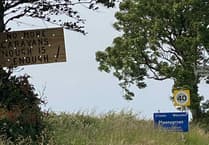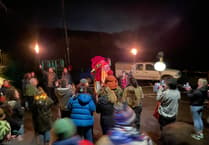Rewilding has become “toxic, contentious, and eclectic” and is not relevant when talking about projects in mid Wales, according to local environmentalists and farmers.
While rewilding has become hailed as a way to tackle climate change, many in mid Wales believe it’s incompatible with local communities with the “unhelpful” term becoming “ill-defined”.
Dafydd Morris Jones, who owns a farm near Ponterwyd, said the issue with rewilding comes back to definition and rhetoric: “I don’t think there is good and bad rewilding, it’s become so ill-defined and so much of a magpie movement it verges on populism.
“I never see populism as a good thing, it takes all nuance out of the conversation. It’s got to a point now its so toxic, so contentious, and eclectic that it’s become unhelpful.
“Rewilding gets in the way and stops the right sort of change happening, we’re talking about good vs bad rewilding when in reality it’s not about that. It’s about rewilding vs something more nuance.”
Andy Rowland, manager at Ecodyfi, said: “I don’t think rewilding is a very useful term to use in the mid Wales context. For some people it conjures up images of wolves and of land that’s no longer managed and not producing food.
“Nobody is proposing that here.”
Director of NFU Cymru John Mercer, who owns a farm in Cwrt-y-Cadno, sees rewilding as a threat to local farmers and believes it is an “insult to the great work” farmers are already doing.
“Wales produces some of the best food and drink in the world. We have ambitions, as farmers, to produce more. But that is not at the expense of the environment,” John explained.
“Wales is renowned across the world for its beauty, but that’s a farmed landscape – it doesn’t just happen like that. A lot of time and effort goes into it to create the nature and landscape we have.
“The majority of Wales is built on farming as a bedrock.
“If you take away farmland, not only are you taking away the ability to produce food and self-sufficiency, you’re also removing an economic driver, a family, and the cultural fabric of Wales.”
County advisor for Ceredigion for NFU Cymru Peter Howells said: “The rewilding debate ignores all the good work the farmers are already doing in terms of contributing to the environment.”
John added: “I think we’re doing good work anyway, it’s in a farmer’s best interest. We’ve planted, over the years, thousands and thousands of acres of hedgerows, we’ve done pond and waterway restoration, woodland creation and management. And we’ve done all these things alongside farming.”
Peter said mid Wales should not be a “test-bed” for outside environmental projects: “What happens in the area should be about the people who live there, the people who raise families there, who manage and care for the land.
“It shouldn’t be a test-bed for some idea from a campaign group with some romantic notion of what mid Wales should look like.”
But Dafydd, who is involved with former rewilding project Summit to Sea, said rewilding can never work with communities and should be abandoned as a term altogether: “The rewilding movement has started using people and community friendly language, but there’s very little evidence that it goes beyond rhetoric.
“Rewilding fragments the two, it sets a Yellow Stone-esque charismatic wildlife focus on one hand and people on the other. When you try to mesh the two together, it’s a square peg and round hole situation.
“Despite the fact that the discourse is moving that way it’s not a natural fit, it’s always going to be an unhappy bed fellow.”
SUMMIT TO SEA
Building trust after ‘mother of all mistakes’
The Summit to Sea project has spent the past three years attempting to build trust with mid Wales communities after a controversial “false start” in 2018
In October 2019, Glantwymyn Councillor Elwyn Vaughan labelled the project “privileged middle-class romanticism”, due to the project being headed up by Rewilding Britain.
Dafydd Morris Jones, who owns a farm near Ponterwyd, was opposed to the project when it first came to fruition in 2018: “As a farmer that has always been of a conservation mindset, the first iteration with Rewilding Britain felt like a betrayal and step back towards about 15 years ago, in terms of relationships between agriculture and conservationists.
“The concerns came from the trustworthiness of the organisation, the focus of their future economic forecasts, the nature of their interventions, and their relationships with their funders. The first draft was drawn up without liaison with the local community.
“It smacked of a level of nepotism that people at local level aren’t comfortable with.”
Following the furious backlash, Rewilding Britain pulled out in October 2019. In June 2020, it was announced management of the project would be taken on by RSPB Cymru, who would work with local stakeholders.
Dafydd added: “I was at the Talybont meeting when the community opposed Rewilding Britain. The message we gave to them was ‘we don’t want to speak to you until they’re gone’.
“Then they left. It was then incumbent on those that gave that message to speak to them. So, to hold up our side of bargain, we started talking.”
Dafydd has since become a freelance consultant on the liaison group for Summit to Sea, helping to develop their recently published project blueprint, “based on the co-productive model”.
The Summit to Sea project no longer considers itself rewilding as it no longer fits the definition of rewilding, which Dafydd describes as too general and increasingly difficult to “pin down”.
Dafydd said Summit to Sea considers the needs of the community at the heart of their plans, which rewilding does not: “If you’re rewilding, the problem and the steps are structured to reach what you think rewilding is, rather than starting with the needs of the communities and landscapes.”
Siân Stacey, project development officer for Summit to Sea, said the project has not been associated with rewilding since Rewilding Britain left the project.
She added: “The project does not have a ‘rewilding’ priority, this reflects the co-design process in which the voices of locals have been brought together. Therefore, rewilding is not a priority that’s been highlighted during the process and as such there is no rewilding focus in this project.
“It’s about collaboration within an empowered community, giving local stakeholders control and ownership of their own priorities, and sharing our practises, learning and knowledge with pride and a desire to collectively improve our area for nature, for ourselves, for our guests and customers, and for future generations.”
Summit to Sea have recently published their project blue print and, after consultation with the community and the liaison group, Dafydd said they are hoping to publish their final project in May this year.
“At the moment, it’s a particularly positive project, one of the most co-productive of projects I’ve ever been involved in,” Dafydd said.
“The method they’ve used for the blueprint has been exceptionally collaborative. It still needs co-honing and co-designing, and in reality we’re two years into a process that started with the mother of all mistakes.
“Trust needs to be won back, and we need to work at the speed that trust takes.
“I think because of the false start, I think there still aren’t enough voices in the process – but that’s what I mean by moving at the speed of trust. With such a clanger of a start, the project needs time to mature.
“There is certainly less opposition. But the problem is the wider rewilding narrative, from social media and the dominate narrative from England, it keeps niggling at a very fresh wound.”
As the project looks to rebrand itself, some concerns are still being voiced.
Despite initial reservations, Cllr Vaughan says the project has “learnt a lesson in a hard way” and has improved, but that there are still local concerns regarding the funding source.
“There are still concerns by some about the main funding source, which is the Endangered Landscapes Programme (ELP), because there are some people suspicious about their hidden agenda,” Cllr Vaughan said.
Dafydd added: “About funding, I am 50/50. I think a different thing every morning. When you break it down to it’s core, the scale of agribusiness can never compete with family businesses, it drives unsustainable practices. ELP being the main drivers of unsustainable practice, do we want to give them an excuse to look as if they’re doing good?
But any money that does good, does good. Regardless where it comes from. And if we can teach people how to invest better and have impacts that are lasting, this has a far greater positive effect than the money itself.
“You have to have such strong levels of local ownership that you tie the funder to what is thought locally – you can never let the funder drive what is happening.”
The Summit to Sea project blueprint can be viewed here http://www.summit2sea.wales/projectblueprint/
Concerns about sale of farms for carbon-offset schemes
Adding to the anxiety around rewilding and concerns about mid Wales “becoming a test bed for whims and ideas of campaign groups who have no real connection to the area”, are reports of farmland being bought for carbon-offset projects.
According to the Farmers’ Union of Wales (FUW), 75 percent of afforestation applications in Wales for over 50 ha of planting are from charities and private companies based in England.
In response to reports of land being bought in Wales for the purpose of tree planting and carbon sequestration, the FUW hosted a webinar on 19 January, called Preventing Wales’ Corporate Carbon Land Grab” balancing carbon, trees and rural communities’.
The webinar was chaired by FUW policy officer Teleri Fielden.
Teleri explained that the future value of carbon offsets is also driving afforestation and land purchases. However, the current carbon market is voluntary therefore private companies can purchase carbon credits without having to reduce their emissions in the first instance.
She said: “Some see this as a lucrative future market for landowners. Indeed, if the price of carbon rises to £50 per tonne, payments for carbon sequestration could be worth up to £1.7 billion per year in the UK, but there remain two key issues within the control of this market.
“Firstly, the market isn’t being led or controlled by farmers who currently manage land in Wales, and secondly, the demands on land are increasing – carbon is just one of them.”
In December 2021, Gwynedd Council voted to call on the Welsh Government to ensure Glastir Woodland Creation (GWC) grants would only be available to active farmers in Wales to stop companies outside of Wales from “purchasing farms, gaining large GWC grants and using the land for afforestation to offset their carbon emissions.”
GWC grants are described as the “Welsh Government’s sustainable land management scheme, through which financial support is offered to farmers and land managers”, according to Natural Resources Wales (NRW).
Director of NFU Cymru John Mercer, said: “The Welsh Government manifesto spoke about having a national forest from north to south.
“What we’ve seen is companies from cities buying up forestry trees as an investment and to offset carbon. What we’re saying is we don’t want Wales to become a dumping ground for companies looking to offset their carbon.
“At NFU Cymru, we’re not against tree planting. What we’re saying is the right tree and the right place.”
NFU Cymru county advisor Peter Howells added: “It is a definite concern, when you’re talking about external investors coming into the area, buying up land with the view of planting trees. There’s huge hypocrisy around it as they will continue to use Wales as an offset while they continue to spew out carbon in their daily lives.
“There’s no real care and no real after thought in terms of the impact on the community.”


.jpeg?width=209&height=140&crop=209:145,smart&quality=75)


Comments
This article has no comments yet. Be the first to leave a comment.